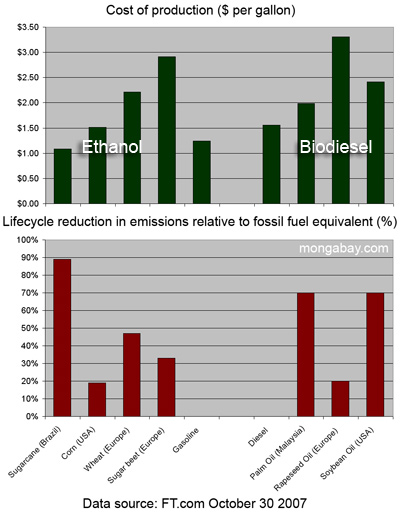Dutch: no subsidies for biofuels-driven rainforest destruction
Dutch: no subsidies for biofuels-driven rainforest destruction
mongabay.com
October 31, 2007
The Dutch government will exclude palm oil from “green energy” subsidies as growing evidence suggests that palm oil is often less sustainable than advertised.
Key to the decision was research presented by Wetlands International that showed the climate impact of the conversion of carbon-rich peat lands for oil palm plantations. Wetlands found that peat lands conversion and associated fires maybe be responsible for emissions of more than 2 billion tons of carbon dioxide in some years, making Indonesia the third largest emitter of greenhouse gases despite having the world’s twenty-second largest economy. Oil palm plantations in the country have expanded from 600,000 hectares in 1985 to more than 6 million hectares in early 2007.

|
In a statement, Wetlands International said it welcomed the Dutch government’s formal ban on new subsidies for palm oil.
The Dutch government says it will only consider lifting if the palm oil industry “is able to develop a clear certification scheme that guarantees the fulfillment of sustainability criteria”, according to Wetlands. “Such criteria must involve a full carbon account and exclude palm oil produced on peatlands and recently deforested areas. In addition, criteria must take account of social issues.”
Biofuels = big subsidies for industrial agriculture
The biofuels sector is heavily subsidized. According to the Financial Times (October 30, 2007), support for ethanol and biodiesel production in OECD members costs $13 to $15 billion per year.
“The cost of support per litre of ethanol varies between $0.29 and $0.36 per litre in the US and $1 in the EU,” writes Martin Wolf, author of the Financial Times article. “Support for biodiesel varies between $0.2 per litre in Canada and $1 in Switzerland. But the cost of petrol, in terms of equivalent energy units, is $0.34 and of diesel is $0.41. Thus, the subsidy to biofuels is often greater than the cost of the fossil fuel equivalent.”







